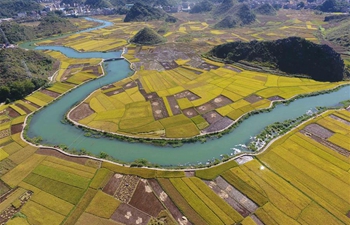
Photo taken on Sept. 23, 2018 shows a forum to launch the Famine Action Mechanism at the UN headquarters in New York. UN Secretary-General Antonio Guterres on Sunday hailed the World Bank/United Nations Famine Action Mechanism (FAM) as an important new tool to help predict and prevent famine. (Xinhua/Li Muzi)
UNITED NATIONS, Sept. 23 (Xinhua) -- UN Secretary-General Antonio Guterres on Sunday hailed the World Bank/United Nations Famine Action Mechanism (FAM) as an important new tool to help predict and prevent famine.
With the cooperation of humanitarian development organizations, tech companies, academia, the insurance sector and others, this initiative is a successful multi-stakeholder partnership, he told a forum for the launch of the mechanism at UN Headquarters in New York.
"FAM will give a more accurate picture of food security in real time, triggering early action from donors and humanitarian agencies that will save lives and prevent further suffering," he said.
The mechanism will use state-of-the-art technologies, including artificial intelligence and machine learning, to detect correlations between different risks, he noted.
Creating and strengthening partnerships will help donors, affected countries and international organizations to bridge funding gaps along the entire humanitarian cycle, from prevention and preparedness to emergency response, said the UN chief.
"With the Famine Action Mechanism, we are renewing our pledge to zero tolerance for famine and acute food insecurity. We are renewing our pledge to feed everyone in our world and to leave no one behind."
"This very basic goal should be within our grasp. With today's advanced technology and knowledge of agriculture, we can surely uphold everyone's fundamental right to food, " he said. "But sadly, harrowing images of parents holding their malnourished children, helpless in the face of tragedy, are not consigned to history."
After years of progress on hunger, the world is losing ground. The number of undernourished people is rising -- to more than 820 million in 2017, he said.
"In our world of plenty, one person in every nine does not have enough to eat. Around 155 million children are chronically malnourished and may suffer the effects of stunting for their entire lives."
There are many reasons for this reversal, including spreading conflict, growing inequality and the impact of climate change. But without ending hunger everywhere, the international community cannot be satisfied with the progress on the 2030 Agenda for Sustainable Development anywhere, he said.
"In our interconnected world, peace, stability and prosperity on a healthy planet depend on leaving no one behind."
During the IMF-World Bank spring meetings in 2017, World Bank President Jim Yong Kim and Guterres committed themselves to zero tolerance for famine. As a follow-up, the World Bank, the United Nations, the International Committee of the Red Cross and other global partners began to develop FAM, the first global mechanism dedicated to famine prevention, preparedness and early action.
The mechanism has the support of global technology companies, including Microsoft, Google and Amazon Web Services.















